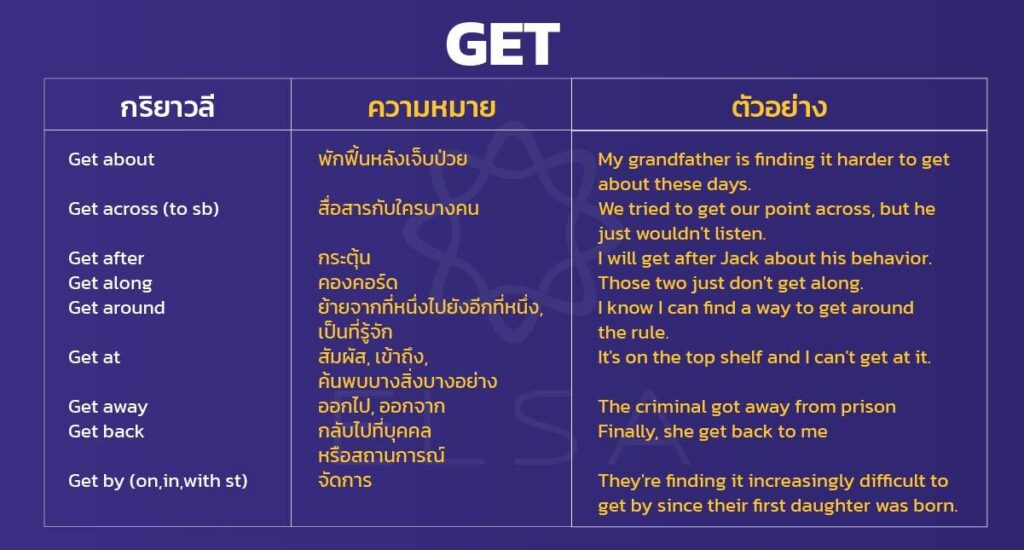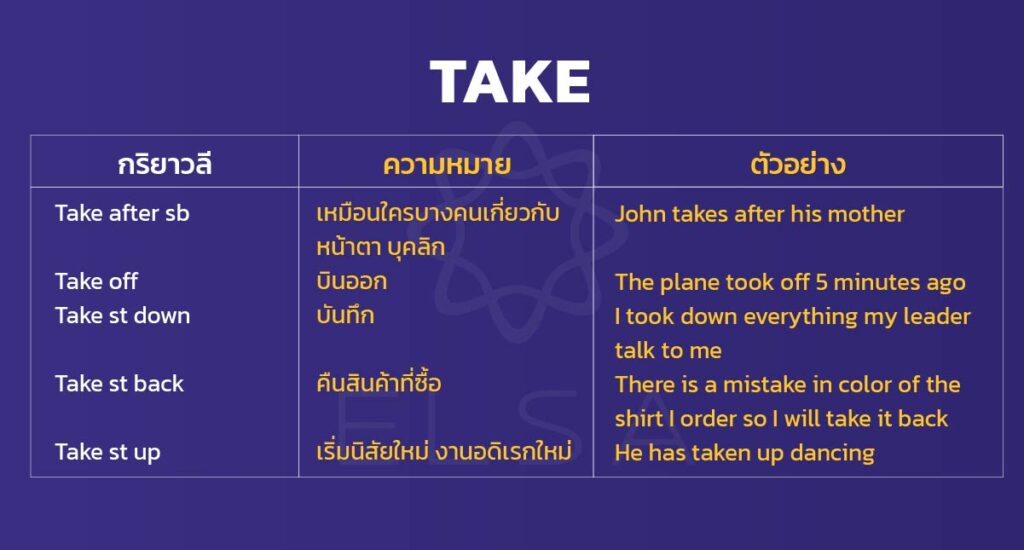Phrasal verbs (กริยาวลี) จะช่วยให้คุณมั่นใจและสบายใจมากขึ้นเมื่อใช้ภาษาอังกฤษ ไม่มีความรู้สึกแข็งกระด้างในการแสดงออกอีกต่อไป นี่เป็นผู้ช่วยที่ดีหากคุณต้องการสื่อสารอย่างคล่องแคล่วเหมือนเจ้าของภาษา
ดังนั้น ELSA Speak จะแบ่งปันทุกสิ่งที่คุณจำเป็นต้องรู้เกี่ยวกับ phrasal verbs และรายการมี 200 phrasal verbs ที่พบบ่อยที่สุด
Phrasal verb (กริยาวลี) คืออะไร?
Phrasal verb คือการรวมกันของกริยา 1 คำและ1 หรือ 2 อนุภาค (particles) โดยอนุภาคเหล่านี้สามารถเป็นคำบุพบท (particles) หรือคำวิเศษณ์ (adverb) อย่างไรก็ตาม เมื่อมีการเพิ่มอนุภาคเหล่านี้เข้าไป ความหมายของ phrasal verb จะแตกต่างอย่างสิ้นเชิงจากคำกริยาที่ประกอบขึ้น
มาดู phrasal verb ตัวอย่างประโยค:
Pick: เลือก
“We need to pick which meal we’d like to eat”
แต่เมื่อเราเติม up หลัง pick จะเกิดอะไรขึ้น?
Phrasal verb: Pick up
ความหมายของ pick up มีการเปลี่ยนแปลงและขึ้นอยู่กับบริบทซึ่งจะมีความหมายแตกต่างกัน เช่น
- ปรับปรุง ดีขึ้น: The weather is picking up lately, isn’t it?
ช่วงนี้อากาศเริ่มดีขึ้นแล้วใช่ไหม?
- ไปรับใคร: Can you pick up Jenny after football practice?
คุณไปรับเจนนี่หลังซ้อมฟุตบอลได้ไหม
- รับบางสิ่ง: Can you pick up my parcel from the post office?
คุณสามารถรับพัสดุของฉันจากที่ทำการไปรษณีย์ได้หรือไม่?
- ได้รับความรู้: James picked up Spanish really quickly.
เจมส์พูดภาษาสเปนได้เร็วมาก
ว้าว แค่เติม “up” ตามหลัง ก็สร้างความแตกต่างได้มากแล้ว
จดโน้ต: Phrasal verb = verb + particles (คำบุพบท หรือคำวิเศษณ์)


ลักษณะและหลักการใช้ phrasal verb
Transitive หรือ Intransitive
การทำความเข้าใจความแตกต่างระหว่างสกรรมกริยา (transitive verbs) และอกรรมกริยา (intransitive verbs) จะช่วยคุณได้มาก
อย่างไรก็ตาม ในบทความนี้ เราไม่ได้พูดถึงการวิเคราะห์ไวยากรณ์ แต่เพียงเข้าใจว่า เพื่อให้ประโยคมีความหมาย ก็ต้อง:
สกรรมกริยา (transitive verbs) = ต้องการบางสิ่งหรือบางคนหลังคำกริยา
อกรรมกริยา (intransitive verbs) = ยืนอยู่คนเดียว
ตัวอย่างเช่น phrasal verb “bump into” มีความหมายว่า บังเอิญเจอใครบางคน และจำเป็นต้องมี “บางคน” ตามกริยาวลีนี้
คุณไม่สามารถพูดว่า
“Yesterday, I bumped into. Haven’t seen her in years!”
แทนที่นั้น คุณควรพูดว่า
“Yesterday, I bumped into Sarah. Haven’t seen her in years!”
ข้อยกเว้น: ในคำพูด เราไม่อยากเปิดเผยว่า เราบังเอิญเจอใคร
“I went to town yesterday. You’ll never guess who I bumped into.”
ฉันไปเมืองเมื่อวานนี้ คุณจะไม่เดาได้ว่าฉันเจอใคร
ถึงกระนั้นก็ตาม “who” คือบางคน ที่เราต้องมีในประโยค เพื่อทำให้ประโยคมีความหมาย
ในทางกลับกัน phrasal verb บางคำเป็นอกรรมกริยา หมายความว่าสามารถยืนอยู่คนเดียวในประโยคได้
ตัวอย่าง:
Grow up: เติบโต โตขึ้น
- They grew up in England.
พวกเขาเติบโตในอังกฤษ
- Your daughter is growing up so fast!
ลูกสาวของคุณโตเร็วมาก!
- When I grow up, I want to be a popstar.
เมื่อฉันโตขึ้น ฉันอยากเป็นป๊อปสตาร์
หมายเหตุ: มี phrasal verb ที่ทั้งเป็นสกรรมกริยาและอกรรมกริยา
Wake up: ตื่น
- I wake up (ฉันตื่น)
- I wake up Sarah (ฉันปลุกซาร่าห์ให้ตื่น)
กริยาวลีที่แยกกันได้ (Separable) และ กริยาวลีที่แยกกันไม่ออก (Inseparable)
เช่นเดียวกับการแยก phrasal verb ออกเป็นสกรรมกริยาและอกรรมกริยา มาทำความคุ้นเคยกับคำนิยาม กริยาวลีที่แยกกันได้ และ กริยาวลีที่แยกกันไม่ออก
กลับไปที่ phrasal verb “wake up” เราอยากปลุกใครสักคนให้ตื่น (waking someone else up) จากนั้น phrasal verb “wake up” จะมาพร้อมกับสักคนหนึ่ง (someone else) ที่เราอยากปลุก
อย่างไรก็ตาม เราสามารถแยก wake up ออกได้ เพราะการใส่ someone else ระหว่าง wake และ up ก็ยังฟังดูดีอยู่ใช่ไหม ความหมายของประโยคจะไม่เปลี่ยนแปลง เจ้าของภาษายังคงใช้สำนวนนี้อยู่บ่อยครั้ง
เราจึงพูดได้ 2 แบบโดยไม่เปลี่ยนความหมาย คือ
- I wake up Sarah
- I wake Sarah up
ภาษาอังกฤษก็หลากหลายและน่าสนใจเหมือนภาษาไทยใช่ไหมล่ะ?
และสุดท้ายจะมีกริยาวลีที่แยกกันไม่ออก
Look up to someone: ชื่นชม เคารพใครบางคน
เราไม่สามารถพูดว่า “look someone up to” หรือ “look up someone to” แต่ควรพูดว่า
“I really look up to my father”
ฉันเคารพพ่อของฉันมาก
การทำความเข้าใจว่า phrasal verb เป็นสกรรมกริยา (transitive) หรืออกรรมกริยา (intransitive) และแยกกันได้ (separable) หรือแยกกันไม่ออก (inseparable) จะช่วยให้คุณใช้งานได้อย่างถูกต้องและก้าวหน้าอย่างรวดเร็ว
ข้อควรจำ: เมื่อเรียน phrasal verb ควรเรียนรู้เพิ่มเติมเกี่ยวกับ transitive – intransitive และ separable – inseparable
วิธีจำ phrasal verbs
ก่อนที่จะให้ phrasal verb ที่ใช้บ่อยที่สุดในการสื่อสารภาษาอังกฤษในชีวิตประจำวัน ELSA Speak จะแบ่งปันเคล็ดลับเพื่อให้คุณจดจำ phrasal verb ได้: เน้นไปที่หัวข้อ
จินตนาการว่า คุณกำลังสนุกกับการแข่งรถฟอร์มูล่าวัน จะมี phrasal จำนวนมากที่ใช้เกี่ยวข้องกับ “pull”:
“Hamilton pulled up at the pit stop, Vettel is pulling away slowly, Rosberg is pulling ahead”
คุณรู้สึกว่าคุณอยู่ในสนามแข่งหรือยัง? ตอนนี้ไปสนามบินกันเถอะ คุณอาจได้ยินหรือเห็นประกาศเกี่ยวกับสัมภาระของคุณ
“The plane takes off in 10 minutes, don’t forget to look after your luggage”
เที่ยวบินจะออกในอีก 10 นาที อย่าลืมตรวจสอบสัมภาระของคุณ
ฝึกฝน: เขียนหัวข้อหรือสถานการณ์ไว้กลางหน้า จากนั้นเพิ่ม phrasal verb ที่คุณรู้จัก (หรือค้นหา) ที่เกี่ยวข้องกับหัวข้อหรือสถานการณ์นั้น อย่าลืมสังเกตว่าแต่ละ phrasal verbs นั้นเป็นสกรรมกริยาหรืออกรรมกริยา แยกกันได้หรือแยกกันไม่ออก
จดโน้ต: เรียน phrasal verbs ตามหัวข้อและสถานการณ์
Phrasal verbs ที่พบบ่อยบางคำ
ด้านล่างนี้ ELSA Speak จะแนะนำ phrasal verbs ที่พบบ่อยตามแต่ละคำกริยา มาดูกันเลย!
- Phrasal verb “FALL”

- Phrasal verb “GET”

- Phrasal verb “GO”

- Phrasal verb “LOOK”

- Phrasal verb “TAKE”

นอกจาก phrasal verb ทั่วไปที่กล่าวถึงข้างต้นแล้ว ยังมีกริยาวลีอื่นๆ อีกมากมายที่คุณอาจจะพบเจอในชีวิตประจำวัน ดังนั้น สร้างพจนานุกรมขนาดเล็กสำหรับตัวคุณเองเพื่อจดจำและนำไปใช้นะ!
Phrasal verbs ที่พบบ่อยที่สุด 200 คำ (รายการ Phrasal verbs ที่สมบูรณ์)
คุณอาจจะกำลังกระตือรือร้นและมุ่งมั่นที่จะเอาชนะ phrasal verbs ทั้งหมดใช่ไหมล่ะ?
อย่างไรก็ตาม ความเร่งรีบนี้จะทำให้คุณรู้สึกเบื่อและยอมแพ้อย่างรวดเร็ว เพราะความจริงแล้ว phrasal verb มีมากมาย แต่ที่ใช้บ่อยที่สุดและใช้กันทั่วไปมีเพียงไม่กี่คำเท่านั้น
เคล็ดลับ: จัดลำดับความสำคัญกับการเรียนรู้และเชี่ยวชาญ phrasal verbs ที่พบบ่อยที่สุด 200 คำ ด้านล่างนี้
>> 100 ประโยคภาษาอังกฤษที่ใช้สื่อสารในชีวิตประจำวัน: ดูที่นี่
Phrasal verbs ที่ขึ้นต้นด้วย A
1. Ask somebody out: เชิญใครสักคนออกเดต
He asked her out to dinner and a movie.
2. Ask around: ถามทุกคนในเรื่องเดียวกัน
I asked around but nobody has seen my wallet.
3. Add up to something: เทียบเท่า
Your purchases add up to $205.32.
Phrasal verbs ที่ขึ้นต้นด้วย B
4. Back something up: ย้อนกลับ
You’ll have to back up your car so that I can get out.
5. Back somebody up: สนับสนุน
My wife backed me up over my decision to quit my job.
6. Blow up: ระเบิด
The racing car blew up after it crashed into the fence.
7. Blow something up: เป่าลม
We have to blow 50 balloons up for the party.
8. Break down: พัง/เสีย (เครื่องจักร ยานพาหนะ)
Our car broke down at the side of the highway in the snowstorm.
9. Break down: เครียด/ใจเสีย
The woman broke down when the police told her that her son had died.
10. Break something down: แยกบางสิ่งออกเป็นส่วนย่อยๆ
Our teacher broke the final project down into three separate parts.
11. Break in: บุกเข้าไปในบ้าน
Somebody broke in last night and stole our stereo.
12. Break into something: บุกเข้าไป (มักใช้กำลังพังประตู/หน้าต่าง)
The firemen had to break into the room to rescue the children.
13. Break something in: การใส่อะไรหลายๆครั้งทำให้ไม่ใหม่เหมือนเคย
The new shoes is so tight that they hurt my feet. I need to break these shoes in before we run next week.
14. Break in: บุกรุก, ขัดจังหวะ
The TV station broke in to report the news of the celebrity’s death.
15. Break up: จบความสัมพันธ์ (เลิกคบใคร)
My boyfriend and I broke up before I moved to America.
16. Break up: หัวเราะออกมาดัง ๆ
The kids just broke up as soon as the clown started talking.
17. Break out: หนี
The prisoners broke out of jail when the guards weren’t looking.
18. Break out in something: เกิดอาการ…/เกิด… (บางอย่างขึ้น ใช้กับอาการทางผิวหนัง)
I broke out in a rash after eating shrimps.
19. Bring somebody down: ทำให้รู้สึกไม่มีความสุข/ทำให้ซึมเศร้า
This sad music is bringing me down.
20. Bring somebody up: เลี้ยงดู (บุตรหลาน)
My grandparents brought me up after my parents died.
21. Bring something up: พูดถึง, หยิบยกหัวข้อใดหัวข้อหนึ่งขึ้นมา
My mother walks out of the room when my father brings up sports.
22. Bring something up: อาเจียน
He drank so much that he brought his dinner up in the toilet.
Phrasal verbs ที่ขึ้นต้นด้วย C
23. Call around: โทรไปหลายที่ หลายคน
We called around but we weren’t able to find the car part we needed
24. Call somebody back: โทรกลับหาใคร
I called the company back but the offices were closed for the weekend.
25. Call something off: ยกเลิก
Jason called the wedding off because he wasn’t in love with his fiancé.
26. Call on somebody: ถามความคิดเห็นหรือคำตอบของใครบางคน
The professor called on me for question 1.
27. Call on somebody: ไปเยี่ยมใครสักคน
We called on you last night but you weren’t home.
28. Call somebody up: โทรหา
Give me your phone number and I will call you up when we are in town.
29. Calm down: ทำให้ใจเย็นลง
You are still mad. You need to calm down before you drive the car.
30. not care for somebody/something: ไม่ชอบใครบางคน/บางสิ่งบางอย่าง
I don’t care for his behaviour.
31. Catch up: ไปถึง/ไปทัน จุดที่คนอื่นอยู่
You’ll have to run faster than that if you want to catch up with Marty.
32. Check in: มายืนยันการจองโรงแรมหรือรับตั๋วที่สนามบิน
We will get the hotel keys when we check in.
33. Check out: ลงทะเบียนออกจากโรงแรม
You have to check out of the hotel before 11:00 AM.
34. Check somebody/ something out: กลั่นกรอง ตรวจสอบ
The company checks out all new employees.
35. Check out somebody/ something: ดู…สิ (ใช้แบบไม่เป็นทางการ)
Check out the crazy hair on that guy!
36. Cheer up: มีความสุขมากขึ้น
She cheered up when she heard the good news.
37. Cheer somebody up: ทำ…ให้ร่าเริง/ทำ…ให้มีความสุข
I brought you some flowers to cheer you up
38. Chip in: ช่วยเหลือ
If everyone chips in we can get the kitchen painted by noon.
39. Clean something up: ทำความสะอาด/จัดให้เรียบร้อย
Please clean up your bedroom before you go outside.
40. Come across something: พบโดยบังเอิญ
I came across these old photos when I was tidying the closet.
41. Come apart: แยกกัน
The top and bottom come apart if you pull hard enough.
42. Come down with something: ป่วย
My nephew came down with chicken pox this weekend.
43. Come forward: อาสาสมัครเพื่อปฏิบัติภารกิจหรือแสดงหลักฐาน
The woman came forward with her husband’s finger prints.
44. Come from some place: มาจากที่ไหนสักแห่ง
The art of origami comes from Asia.
45. Count on somebody/ something: พึ่งพาใครบางคน/บางสิ่งบางอย่าง
I am counting on you to make dinner while I am out.
46. Cross something out: ลบ
Please cross out your old address and write your new one.
47. Cut back on something: บริโภคน้อยลง
My doctor wants me to cut back on sweets and fatty foods.
48. Cut something down: ตัดบางอย่างออก
We had to cut the old tree in our yard down after the storm.
49. Cut in: รบกวน, ขัดจังหวะ
Your father cut in while I was dancing with your uncle.
50. Cut in: แทรก/แซง (รถแซงแบบปาดหน้ากระชั้นชิด)
The bus driver got angry when that car cut in.
51. Cut in: เริ่มปฏิบัติการ
The air conditioner cuts in when the temperature gets to 22°C.
52. Cut something off: ตัดบางสิ่งออกด้วยของมีคม
The doctors cut off his leg because it was severely injured.
53. Cut something off: stop providing – หยุดให้บริการ
The phone company cut off our phone because we didn’t pay the bill.
54. Cut somebody off: take out of a will – ลบชื่อใครบางคนออกจากพินัยกรรม
The phone company cut off our phone because we didn’t pay the bill.
55. Cut something out: remove part of something (usually with scissors and paper) – ตัดบางอย่างออก (โดยปกติจะใช้กรรไกรตัดกระดาษ)
I cut this ad out of the newspaper.
Phrasal verbs ที่ขึ้นต้นด้วย D
56. Do something over: do again – ทำซ้ำบางสิ่งบางอย่าง
My teacher wants me to do my essay over because she doesn’t like my topic.
57. Do away with something: discard – กำจัด
It’s time to do away with all of these old tax records.
58. Do something up: fasten, close – ปิด
Do your coat up before you go outside. It’s snowing!
59. Dress up: wear nice clothing – สวมเสื้อผ้าที่ดี
It’s a fancy restaurant so we have to dress up.
60. Drop back: move back in position/ group – ลดระดับในตำแหน่ง
Andrea dropped back to third place when she fell off her bike.
61. Drop in/ by/ over: come without an appointment – แวะมา…/มาโดยไม่ได้นัด…
I might drop in/by/over for tea sometime this week.
62. Drop somebody/ something off: take somebody/ something somewhere and leave them/ it there – ไปส่ง/มาส่ง…(คนหรือสิ่งของ)…
I have to drop my sister off at work before I come over.
63. Drop out: quit a class, school – เลิกเรียน, ออกจากเรียน
I dropped out of Science because it was too difficult.
Phrasal verbs ที่ขึ้นต้นด้วย E
64. Eat out: eat at a restaurant – รับประทานอาหารนอกบ้าน
I don’t feel like cooking tonight. Let’s eat out.
65. End up: eventually reach/do/decide – ในที่สุดก็ตัดสินใจ/มาถึง/ทำบางสิ่งได้สักที
We ended up renting a movie instead of going to the theatre.
Phrasal verbs ที่ขึ้นต้นด้วย F
66. Fall apart: break into pieces – แตกเป็นเสี่ยง ๆ/แตกเป็นชิ้น ๆ
My new dress fell apart in the washing machine.
67. Fall down: fall to the ground – ตกพื้น
The picture that you hung up last night fell down this morning.
68. Fall out: seperate from an interior – ร่วงหล่น
The money must have fallen out of my pocket.
69. Figure something out: understand, find the answer – เข้าใจ…/หาคำตอบของ…ได้/รู้ว่า…ได้/แก้ไข…(โจทย์/ปัญหา/ปริศนา)…ได้
I need to figure out how to fit the piano and the bookshelf in this room.
70. Fill something in/ out: to write information in blanks, as on a form – กรอกข้อมูลลงแบบฟอร์ม/เอกสาร
To write information: กรอกข้อมูล ภาษาอังกฤษ
Please fill in the form with your name, address, and phone number.
The form must be filled out in capital letters.
71. Fill something up: fill to the top – เติมให้เต็มฝา
I always fill the water jug up when it is empty.
72. Find out: discover – คิดออก/รู้/เจอ/พบคำตอบ
We don’t know where he lives. How can we find out?
73. Find something out: discover about something – ค้นพบบางสิ่งบางอย่าง
We tried to keep the time of the party a secret, but Samantha found it out.
Phrasal verbs ที่ขึ้นต้นด้วย G
74. Get something across/ over: communicate, make understandable – แลกเปลี่ยน ชี้แจง
I tried to get my point across/over to the judge but she wouldn’t listen.
75. Get along/ on: like each other – ชอบกัน/เข้ากันได้
I was surprised how well my new girlfriend and my sister got along/on.
76. Get around: have mobility – เคลื่อนไหวที่ยืดหยุ่น, ว่องไว
My grandfather can get around fine in his new wheelchair.
77. Get away: go on a vacation – ไม่อยู่/ไปเที่ยว (มักใช้กับการไปเที่ยวในวันหยุด)
We worked so hard this year that we had to get away for a week.
78. Get away with something: do without being noticed or punished – ทำอะไรโดยไม่ถูกจับหรือลงโทษ
Jason always gets away with cheating in his maths tests.
79. Get back: return – กลับมา (จากสถานที่ต่าง ๆ)/กลับบ้าน
We got back from our vacation last week.
80. Get something back: receive something you had before – เอาสิ่งที่เคยเป็นกลับคืนมา
Liz finally got her Science notes back from my room-mate.
81. Get back at somebody: retaliate, take revenge – โต้กลับ, แก้แค้นใครบางคน
My sister got back at me for stealing her shoes. She stole my favourite hat.
82. Get back into something: become interested in something again – กลับมาสนใจ…อีกครั้ง
I finally got back into my novel and finished it.
83. Get on something: step onto a vehicle – ขึ้น (รถไฟ/รถประจำทาง)
We’re going to freeze out here if you don’t let us get on the bus.
84. Get over something: recover from an illness, loss, difficulty – ฟื้นฟูจาก… (โรค)…/หายจาก… (อาการ)…
I just got over the flu and now my sister has it.
85. Get over something: overcome a problem – เอาชนะปัญหา
The company will have to close if it can’t get over the new regulations.
86. Get round/ around to something: finally find time to do – ในที่สุดก็มีเวลาทำอะไรบางอย่าง
I don’t know when I am going to get round to writing the thank you cards.
87. Get together: meet (usually for social reasons) – เจอกัน (พบปะสังสรรค์)
Let’s get together for a BBQ this weekend.
88. Get up: ตื่นนอน
I got up early today to study for my exam.
89. Give somebody away: reveal hidden information about somebody – เปิดเผยข้อมูล, ประณามใครบางคน
His wife gave him away to the police.
90. Give somebody away: take the bride to the altar – พาเจ้าสาวเข้าพิธีแต่งงาน
My father gave me away at my wedding.
91. Give something away: ruin a secret – เผยโฉม
My little sister gave the surprise party away by accident.
92. Give something away: give something to somebody for free – ให้คนไหนบางสิ่งบางอย่าง
The library was giving away old books on Friday.
93. Give something back: return a borrowed item – คืนของที่ยืมมา
I have to give these skates back to Franz before his hockey game.
94. Give in: reluctantly stop fighting or arguing – เลิกทะเลาะหรือโต้เถียงกันตามอำเภอใจ
My boyfriend didn’t want to go to the ballet, but he finally gave in.
95. Give something out: give to many people (usually at no cost) – แจกจ่ายให้กับหลาย ๆ คน (โดยปกติจะไม่มีค่าใช้จ่าย)
They were giving out free perfume samples at the department store.
96. Give something up: quit a habit – เลิกนิสัย
I am giving up smoking as of January 1st.
97. Give up: stop trying
My maths homework was too difficult so I gave up.
98. Go after somebody: follow somebody – ติดตามใครบางคน
My brother tried to go after the thief in his car.
99. Go after something: try to achieve something – ตาม… (ตามฝัน/ตามเป้าหมาย/ทำให้สำเร็จตามเป้าหมาย)
I went after my dream and now I am a published writer.
100. Go against somebody: compete, oppose – แข่งขัน/คัดค้าน
We are going against the best soccer team in the city tonight.
101. Go ahead: start, proceed – เริ่ม/ดำเนินการ
Please go ahead and eat before the food gets cold.
102. Go back: return to a place – กลับ (ไปยัง)…
I have to go back home and get my lunch.
103. Go out: leave home to go on a social event – ออกไปข้างนอก
We’re going out for dinner tonight.
104. Go out with somebody: date – ออกเดต
Jesse has been going out with Luke since they met last winter.
105. Go over something: review – ตรวจทาน/ตรวจดูอีกครั้ง
Please go over your answers before you submit your test.
106. Go over: visit somebody nearby – ไปเยี่ยม
I haven’t seen Tina for a long time. I think I’ll go over for an hour or two.
107. Go without something: suffer lack or deprivation – ขาด…/ไม่มี… (สิ่งที่ควรมี)
When I was young, we went without winter boots.
108. Grow apart: stop being friends over time – เติบโตไปคนละทิศละทาง (แยกย้ายจากกันเมื่อโตขึ้น)
My best friend and I grew apart after she changed schools.
109. Grow back: regrow – งอกใหม่
My roses grew back this summer.
110. Grow into something: grow big enough to fit – โตพอดีกับ/ขยายพอดีกับ…
This bike is too big for him now, but he should grow into it by next year.
111. Grow out of something: get too big for something – โตขึ้น/ขยายขึ้น (เกินขนาดเดิม)
Elizabeth needs a new pair of shoes because she has grown out of her old ones.
112. Grow up: become an adult – เติบโต
When Jack grows up he wants to be a fireman.
Phrasal verbs ที่ขึ้นต้นด้วย H
113. Hand something down: give something used to somebody else – ส่งต่อ… (มอบของที่ใช้แล้วให้คนอื่นใช้ต่อ)
I handed my old comic books down to my little cousin.
114. Hand something in: submit – ส่ง… (ส่งงานที่ได้รับมอบหมาย)
I have to hand in my essay by Friday.
115. Hand something out: to distribute to a group of people – กระจายไปยังกลุ่มคน
We will hand out the invitations at the door.
116. Hand something over: give (usually unwillingly) – ให้… (มักใช้ในกรณีไม่เต็มใจ)
The police asked the man to hand over his wallet and his weapons.
117. Hang in: stay positive – อดทนไว้… (คำไม่เป็นทางการ)
Hang in there. I’m sure you’ll find a job very soon.
118. Hang on: wait a short time – รอสักครู่ (คำไม่เป็นทางการ)
Hang on while I grab my coat and shoes!
119. Hang out: spend time relaxing – ใช้เวลาผ่อนคลาย/ใช้เวลาอยู่กับเพื่อน ๆ
Instead of going to the party we are just going to hang out at my place.
120. Hang up: end a phone call – วางสาย
He didn’t say goodbye before he hung up.
121. Hold somebody/ something back: prevent from doing/going – ป้องกันไม่ให้…(กระทำบางอย่าง)
I had to hold my dog back because there was a cat in the park.
122. Hold something back: hide an emotion – ซ่อน…ไว้ (ซ่อนความรู้สึก)
Jamie held back his tears at his grandfather’s funeral.
123. Hold on: wait a short time – รอสักครู่
Please hold on while I transfer you to the Sales Department.
124. Hold onto somebody/ something: hold firmly using your hands or arms – จับ…ให้มั่น (จับ…ให้แน่น)
Hold onto your hat because it’s very windy outside.
125. Hold somebody/ something up: rob – ปล้น/จี้
A man in a black mask held the bank up this morning.
Phrasal verbs ที่ขึ้นต้นด้วย K
126. Keep on doing something: continue doing – ทำบางสิ่งต่อไป
Keep on stirring until the liquid comes to a boil.
127. Keep something from somebody: not tell – เก็บรักษา…จาก… (เก็บรักษาบางเรื่องจากบางคนไม่ให้รู้)
We kept our relationship from our parents for two years.
128. Keep somebody/ something out: stop from entering – ห้าม…เข้า
Try to keep the wet dog out of the living room.
129. Keep something up: continue at the same rate – รักษา…ไว้
If you keep those results up you will get into a great college.
Phrasal verbs ที่ขึ้นต้นด้วย L
130. Let somebody down: fail to support or help, disappoint – ทำให้…ผิดหวัง
I need you to be on time. Don’t let me down this time.
131. Let somebody in: allow to enter – อนุญาตให้…เข้ามา
Can you let the cat in before you go to school?
132. Log in/ on: sign in (to a website, database) – เข้าสู่เว็บไซต์หรือฐานข้อมูล
I can’t log in to Facebook because I’ve forgotten my password.
133. Log out/ off: sign out (of a website, database) – ออกจากระบบเว็บไซต์หรือฐานข้อมูล
If you don’t log off somebody could get into your account.
134. Look after somebody/ something: take care of – ดูแล
I have to look after my sick grandmother.
135. Look down on somebody: think less of, consider inferior – ดูถูก
Ever since we stole that chocolate bar your dad has looked down on me.
136. Look for somebody/ something: try to find – ค้นหา…
I’m looking for a red dress for the wedding.
137. Look forward to something: be excited about the future – ตั้งหน้าตั้งตาคอย…
I’m looking forward to the Christmas break.
138. Look into something: investigate – ตรวจสอบ
We are going to look into the price of snowboards today.
139. Look out: be careful, vigilant, and take notice – ระวัง
Look out! That car’s going to hit you!
140. Look out for somebody/ something: be especially vigilant for – ระแวดระวังใครบางคน/บางสิ่งอย่างมาก
Don’t forget to look out for snakes on the hiking trail.
141. Look something over: check, examine – ตรวจ/ตรวจสอบ
Can you look over my essay for spelling mistakes?
142. Look something up: search and find information in a reference book or database – ค้นหาข้อมูล/เบอร์โทร/ที่อยู๋ ในหนังสืออ้างอิงหรือสมุดโทรศัพท์
We can look her phone number up on the Internet.
143. Look up to somebody: have a lot of respect for – มีความเคารพ…/ให้ความเคารพ…อย่างมาก
My little sister has always looked up to me.
Phrasal verbs ที่ขึ้นต้นด้วย M
144. Make something up: invent, lie about something – แต่งเรื่อง… /สร้างเรื่อง…/โกหก…
Josie made up a story about why we were late.
145. Make up: forgive each other – ให้อภัยกันและกัน
We were angry last night, but we made up at breakfast.
146. Make somebody up: apply cosmetics to – แต่งหน้าให้…
My sisters made me up for my graduation party.
147. Mix something up: confuse two or more things – ผสมปนเป…/สลับสับสน…
I mixed up the twins’ names again!
Phrasal verbs ที่ขึ้นต้นด้วย P
148. Pass away: die – ตาย, เสียชีวิต
His uncle passed away last night after a long illness.
149. Pass out: fain – เป็นลม
It was so hot in the church that an elderly lady passed out.
150. Pass something out: give the same thing to many people – แจก
The professor passed the textbooks out before class.
151. Pass something up: decline (usually something good) – ปฏิเสธ, เพิกเฉย (มักจะเป็นสิ่งที่ดี)
I passed up the job because I am afraid of change.
152. Pay somebody back: return owed money – ใช้หนี้แก่…
Thanks for buying my ticket. I’ll pay you back on Friday.
153. Pay for something: be punished for doing something bad – ถูกลงโทษเพราะ…
That bully will pay for being mean to my little brother.
154. Pick something out: choose – เลือก
I picked out three sweaters for you to try on.
155. Point somebody/ something out: indicate with your finger – ชี้ไปที่บางคน/บางสิ่ง
I’ll point my boyfriend out when he runs by.
156. Put something down: put what you are holding on a surface or floor – วาง…ลง
You can put the groceries down on the kitchen counter.
157. Put somebody down: insult, make somebody feel stupid – ดูหมิ่น…/ทำให้….รู้สึกแย่หรือเสียหน้า
The students put the substitute teacher down because his pants were too short.
158. Put something off: postpone – เลื่อน…ออกไป (เลื่อนเวลา)
We are putting off our trip until January because of the hurricane,
159. Put something out: extinguish – ดับ
The neighbours put the fire out before the firemen arrived.
160. Put something together: assemble – ต่อ/ประกอบ…
I have to put the crib together before the baby arrives.
161. Put up with somebody/ something: tolerate – อดทนต่อ…
I don’t think I can put up with three small children in the car.
162. Put something on: put clothing/ accessories on your body – สวมใส่ (ใช้กับเครื่องประดับและเครื่องนุ่งห่ม)
Don’t forget to put on your new earrings for the party.
Phrasal verbs ที่ขึ้นต้นด้วย R
163. Run into somebody/ something: meet unexpectedly – พบเจอโดยบังเอิญ
I ran into an old school-friend at the mall.
164. Run over somebody/ something: drive a vehicle over a person or thing – ชนข้ามบางสิ่งบางอย่าง / บางคน
I accidentally ran over your bicycle in the driveway.
165. Run over/ through something: rehearse, review – ซ้อม
Let’s run over/through these lines one more time before the show.
166. Run away: leave unexpectedly, escape – วิ่งหนี
The child ran away from home and has been missing for three days.
167. Run out: have none left – หายไปแล้ว
We ran out of shampoo so I had to wash my hair with soap.
Phrasal verbs ที่ขึ้นต้นด้วย S
168. Send something back: return (usually by mail) – ส่งบางสิ่งกลับมา
My letter got sent back to me because I used the wrong stamp.
169. Set something up: arrange, organize – จัดการ…/จัดให้…มีขึ้น
Our boss set a meeting up with the president of the company.
170. Set somebody up: trick, trap – หลอกลวง ติดกับดักใครบางคน
The police set up the car thief by using a hidden camera.
171. Shop around: compare prices – เปรียบเทียบราคา
I want to shop around a little before I decide on these boots.
172. Show off: act extra special for people watching (usually boastfully) – ออกหน้า/โชว์เก่ง/แสดงออกว่าเก่ง (คนไทยเรียกโชว์ออฟ/โชว์พาว)
He always shows off on his skateboard.
173. Sleep over stay somewhere for the night – นอนค้างคืนที่ไหนสักแห่ง
You should sleep over tonight if the weather is too bad to drive home.
174. Sort something out: organize, resolve a problem – จัด, แก้ปัญหา
We need to sort the bills out before the first of the month.
175. Stick to something: continue doing something, limit yourself to one particular thing – ติดอยู่กับการทำบางสิ่ง/ยึดมั่นในการทำบางสิ่ง
You will lose weight if you stick to the diet.
176. Switch something off stop the energy flow, turn off – ปิด…(เครื่องใช้ไฟฟ้า)
The light’s too bright. Could you switch it off.
177. Switch something on start the energy flow, turn on – เปิด…(เครื่องใช้ไฟฟ้า)
We heard the news as soon as we switched on the car radio.
Phrasal verbs ที่ขึ้นต้นด้วย T
178. Take after somebody: resemble a family member – เหมือน…/ตาม…/เจริญรอย…ในครอบครัว
I take after my mother. We are both impatient.
179. Take something apart: purposely break into pieces – จงใจทำให้แตก, ทำให้แตกเป็นชิ้นเล็กชิ้นน้อย
He took the car brakes apart and found the problem.
180. Take something back: return an item – คืนบางสิ่ง
I have to take our new TV back because it doesn’t work.
181. Take off: start to fly – เริ่มบิน/เครื่องขึ้น (ใช้กับเครื่องบิน)
My plane takes off in five minutes.
182. Take something off: remove something (usually clothing, accessories) – tháo bỏ thứ gì đó (thường là quần áo, phụ kiện)
Take off your socks and shoes and come in the lake!
183. Take something out: remove from a place or thing – ถอดออก (มักใช้กับเครื่องนุ่งห่ม)
Can you take the garbage out to the street for me?
184. Take somebody out: pay for somebody to go somewhere with you – พา…ไปด้วย
My grandparents took us out for dinner and a movie.
185. Tear something up: rip into pieces – หั่นเป็นชิ้น
I tore up my ex-boyfriend’s letters and gave them back to him.
186. Think back to/ on: remember – จดจำ
When I think back on my youth, I wish I had studied harder.
187. Think something over: consider – พิจารณา
I’ll have to think this job offer over before I make my final decision.
188. Throw something away: dispose of – ทิ้ง/กำจัดออก
We threw our old furniture away when we won the lottery.
189. Turn something down: decrease the volume or strength (heat, light etc) – ลดระดับเสียงหรือความเข้มของ (ความร้อน แสง)
Please turn the TV down while the guests are here.
190. Turn something down: refuse – ปฏิเสธ…
I turned the job down because I don’t want to move.
191. Turn something off: stop the energy flow, switch off – ปิด…(เครื่องใช้ไฟฟ้า)…
Your mother wants you to turn the TV off and come for dinner.
192. Turn something on: start the energy, switch on – เปิด…(เครื่องใช้ไฟฟ้า)…
It’s too dark in here. Let’s turn some lights on.
193. Turn something up: increase the volume or strength (heat, light etc) – เพิ่ม…(เสียง)…/หรือเพิ่มความแรงของไฟหรือความร้อน
Can you turn the music up? This is my favourite song.
194. Turn up: appear suddenly – ปรากฎออกมา (อย่างทันทีทันใด)
Our cat turned up after we put posters up all over the neighbourhood.
195. Try something on: put on sample clothing – ลองสวมใส่…
I’m going to try these jeans on, but I don’t think they will fit.
196. Try something out: test – ทดลอง…/ลองใช้…
I am going to try this new brand of detergent out.
Phrasal verbs ที่ขึ้นต้นด้วย U
197. Use something up: finish the supply – ใช้…หมด
The kids used all of the toothpaste up so we need to buy some more.
Phrasal verbs ที่ขึ้นต้นด้วย W
198. Wake up: stop sleeping – ปลุก
We have to wake up early for work on Monday.
199. Warm up: prepare body for exercise – เตรียมร่างกายก่อนออกกำลังกาย (ที่คนไทยใช้คำว่าวอร์มร่างกาย)
I always warm up by doing sit-ups before I go for a run.
200. Work out: exercise – ออกกำลังกาย
I work out at the gym three times a week.
ELSA Speak เชื่อว่า เชี่ยวชาญ phrasal verbs ทั่วไป 200 คำเหล่านี้ จะช่วยให้คุณปรับปรุงการสื่อสารภาษาอังกฤษอย่างเป็นธรรมชาติที่สุด









